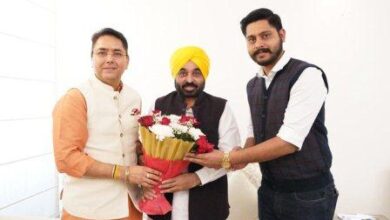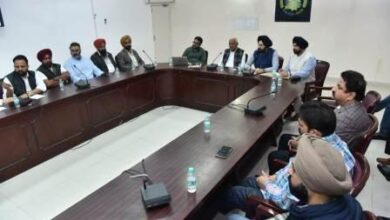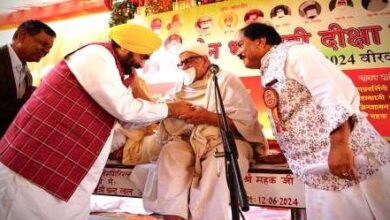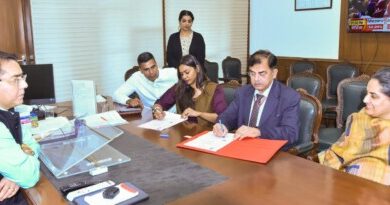Indians Paying Taxes Like England, Yet Receiving Somalia-Like Facilities: Raghav Chadha
In 2019, BJP got 303 seats, this time the public brought it down to 240 by imposing 18 percent GST - Chadha
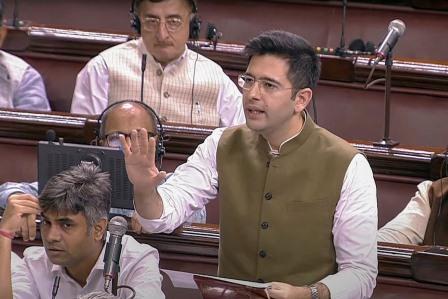
Even BJP supporters are upset with this budget, for 10 years this government has been “sucking the blood” of the common man by imposing taxes – Raghav Chadha
Raghav Chadha: Poor Economy, Inflation, and Unemployment in Rural Areas Key Reasons for BJP’s Lok Sabha Defeat
Chadha gave many suggestions to the central government for a better economy, including linking minimum wages to inflation, giving legal guarantee of MSP to farmers and removing cess-surcharge
Chandigarh/New Delhi, July 25 : Raghav Chadha, the Aam Aadmi Party’s Rajya Sabha MP from Punjab, delivered a compelling speech in Parliament, sharply criticizing the central government’s budget and offering economic recommendations. He attributed the reasons for the ruling party’s defeat in the recent Lok Sabha elections to their economic policies.
Raghav Chadha criticized the recent budget
In his impassioned speech, Raghav Chadha criticized the recent budget, claiming it has disappointed every segment of society, including BJP supporters. He likened the government’s tax policies to being like a leech, alleging they have only increased the burden of the common man. Chadha highlighted that despite the substantial taxes citizens pay, they receive inadequate services in return, such as education, health, and transport facilities comparable to those in Somalia despite taxation levels similar to England’s.
Today, if a common man earns 10 rupees, then the government deducts two-three rupees from it as income tax, two-and-a-half rupees as GST and 1-1.5 rupees in the form of surcharge. He argues that despite these deductions amounting to 7-8 rupees out of every 10 earned, the government fails to provide world-class education, health, and transport facilities to its citizens.
Raghav Chadha Attributes BJP’s Lok Sabha Defeat to Economic Issues
Raghav Chadha succinctly summarized the reasons behind the Bharatiya Janata Party’s defeat in the Lok Sabha elections, emphasizing the economy as the primary factor. He stressed that the poor state of the economy, particularly its severe impact on rural areas where a majority of India’s population resides, led to a decline in BJP’s seats in those regions. Chadha’s analysis underscores the critical role economic conditions play in shaping electoral outcomes, especially in rural constituencies.
He said that in 2019, the Bharatiya Janata Party got 303 seats. This time the people of the country brought them down to 240 seats by imposing an 18 percent GST on it. Today, the economic condition in rural areas is at its lowest level in the last two and a half decades due to inflation, unemployment, economic inequality, debt on farmers and high cost in agriculture and lack of MSP, while the promise was to double the income of farmers and give MSP as per the Swaminathan report.
inflation is increasing and their income is also decreasing
Chadha said that rural wages have decreased in the last 25 months. In 2014, a daily wage laborer could buy 3 kg of tur dal with his one day’s wages, today he is able to buy only 1.5 kg of tur dal. Which means inflation is increasing and their income is also decreasing. Therefore, BJP’s vote share decreased by 5% in rural areas.
The second reason due to which they fared badly in the elections is food inflation. Today, the prices of every commodity, be it flour, milk, rice, curd, have increased a lot. Today food inflation in the country has increased by more than nine percent. The things that we export have become very expensive today and the farmers do not even get the benefit of it. Then where is all that money going?
He also gave many suggestions to the government regarding the economy. The first suggestion is that the government should try to link inflation with minimum wages so that poor people get relief from inflation.
The fourth suggestion he gave was that the long term capital gain tax should remain unchanged or else it will have a bad effect on the real estate sector. Due to this, it will become difficult for people to buy a new house and the builder will also have to bear losses. For this, Chadha also gave an example and explained how the new tax system is harmful. He said that due to this, a huge amount of black money will come into the real estate sector and fraud will take place.
The fifth suggestion encourages financial savings, especially in equity, mutual funds, bank deposits, and financial investments that people maintain for more than two to three years. The sixth suggestion calls for a review of GST, recommending a reduction of GST on MSME sector-related items and the removal of GST from FMCG items.
central government should work like ‘co-operative federalism
The seventh is that there should be no discrimination with the states in terms of funds. The way this time Bihar and Andhra Pradesh were given special packages and other states were ignored, it is not right for federalism. The central government should work like ‘co-operative federalism’, not ‘discriminatory federalism’.
Eighth – The government should reduce cess and surcharge or give it to the states as well. Currently, the central government does not have to share the cess and surcharge money with the states, so the government collects as much money as possible from the common man through this medium. If the central government earns Rs 100, then it earns Rs 18 out of it through cess and surcharge. That means 18 percent tax goes directly into the pocket of the central government. The last suggestion is that the GST compensation given to the states, which has now been stopped, should be extended for at least five more years.

